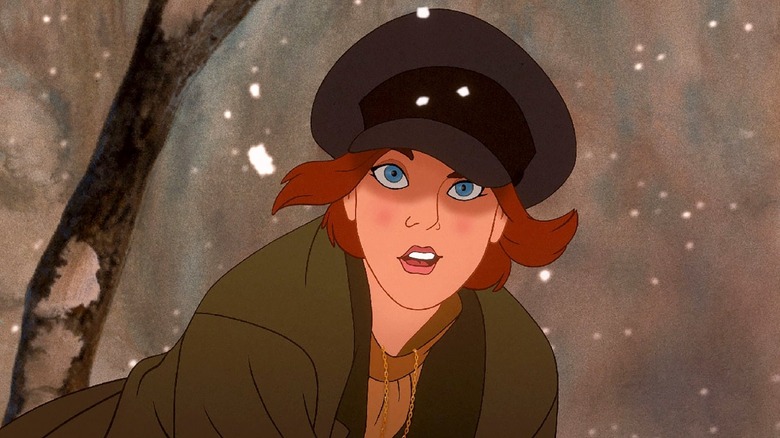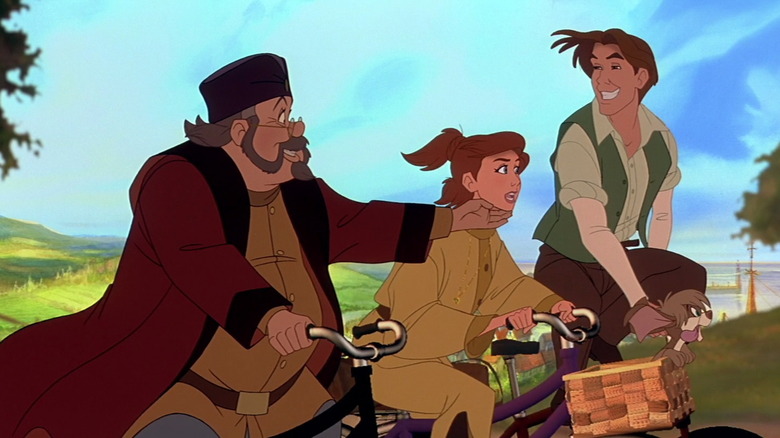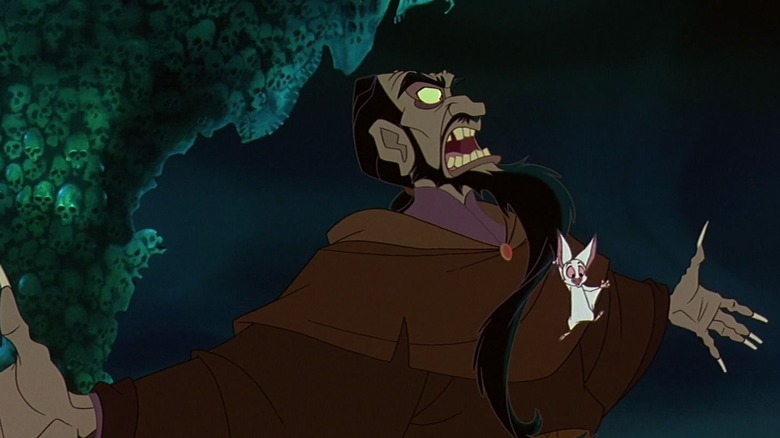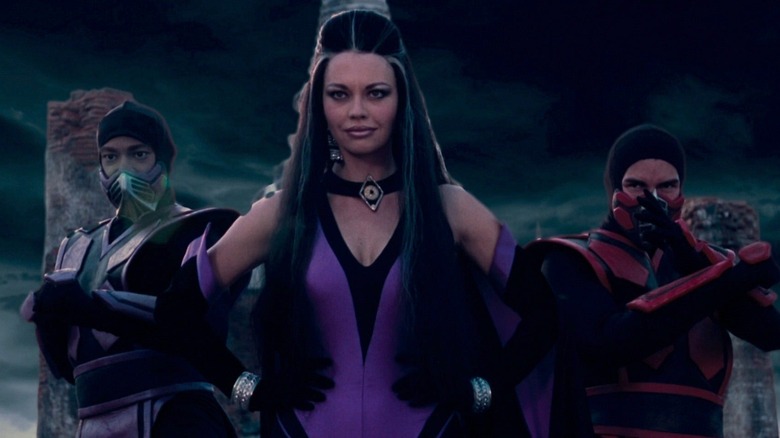How Disney Successfully Prevented Anastasia's Success
Director Don Bluth ("Dragon's Lair," "The Secret of NIMH," "An American Tail," "The Land Before Time," "Titan A.E.") began his career working on several productions for Disney's animation department, notably as animation director on "The Rescuers" and on "Pete's Dragon," but also as a character animator on films like "Robin Hood" (1973) and "Winnie the Pooh and Tigger Too." It was when he was working on the 1981 flick "The Fox and the Hound" that Bluth's career at Disney began to sour. Arguing with the Disney brass as to how to train new animators, and who should retain artistic control on a project, Bluth ended up quitting the studio in order to form Don Bluth Productions. Bluth, like other Disney employees before him, didn't like the studio's iron-fist version of creative command over their branded materials.
Don Bluth Productions was meant to directly challenge Disney. Perhaps feeling that The Mouse had been at the top of the animation heap for too long, Bluth actively sought to unseat their dominance, or, at the very least, offer some legitimate challenges to their deathlike grip on the popular imagination. While the studio's first production, "The Secret of NIMH," was only a modest hit, it eventually become a cult favorite, offering a slightly edgier tone and some scarier imagery than your average Disney animated flick. Don Bluth Productions had to shutter shortly after "NIMH," but Bluth, undeterred innovated several notable animation projects — the animated sequence in "Xanadu," and the video games "Dragon's Lair" and "Space Ace" — before opening Sullivan Bluth Studios in 1985.
From there, Bluth pushed the envelope with a series of hit animated films as listed in the parentheses above. It helped that Steven Spielberg's Amblin studios was behind "An American Tail" as well. "Tail" had the highest-grossing opening of any first-release animated film. It certainly seemed that Bluth was making good on his promise to confront Disney. It helped him that Disney was struggling throughout the 1980s, releasing the enormous flop "The Black Cauldron" the year before. "The Black Cauldron" was such a bomb, there was scuttlebutt in the industry that Disney would shutter their animation department altogether.
Animation in the 1990s
Disney, however, came roaring back into the limelight in the late '80s with the release of "The Little Mermaid," a mega-hit that is often cited as beginning the Disney renaissance. The 1990s were very good for Disney animation, with the studio releasing hit after hit, as well as being the time when the studio's partnership with Pixar began. Bluth, meanwhile, became the one to face a decade of struggle, as his '90s films "Rock-a-Doodle," "Thumbelina," "A Troll in Central Park," and "The Pebble and the Penguin" all lost money ("Troll" remains Bluth's lowest-grossing film to date).
What Bluth needed was something in the Disney mold — perhaps princess-based, and a light musical — but something that was also undeniably his. Bluth signed on to make several features with Fox, originally wanting to make animated versions of either "My Fair Lady" or "The King & I," but gravitated instead toward an animated remake of the 1956 Fox film "Anastasia."
Based very, very loosely on actual Russian history, Bluth's version of "Anastasia" is about the lost princess Anya Romanov (Meg Ryan) who was presumed killed when the Bolsheviks came into power. The Bolsheviks were able to take over Russia, according to the film, due to the aid of Rasputin (Christopher Lloyd), an evil sorcerer who had managed to cast a spell of immortality on himself. Years later, the adult Anya falls in with a grifter and former servant to the Romanovs named Dimitri (John Cusack), who aims to re-install Anya on the throne. Hank Azaria played Bartok, Rasputin's anthropomorphic bat, and the cast boasted Bernadette Peters, Angela Lansbury, and Kelsey Grammar. Lynn Ahrens and Stephen Flaherty wrote the film's amazing songs, with their "Journey to the Past" eventually being nominated for an Academy Award. "In the Dark of the Night," too, is awesome.
Disney gonna Disney
"Anastasia" was scheduled for release in November of 1997, and it was — to my personal recollection — a big, big deal. There were articles published about how "Anastasia" was poised to overtake Disney, and how Bluth was, once again, going to reassert a sense of variety into the current animated marketplace. The film had fast food tie-ins, a massive ad campaign, was selling soundtrack records in advance of the film's release ... it was nearly as ubiquitous as a Disney film.
Disney, however, has a long memory, and the animosity that Bluth felt toward the company was, it turns out, entirely mutual. One can only speculate which executive at Disney decided to launch a counterinsurgency against "Anastasia," or how such a blitzkrieg was worded, or how vitriolic Disney was intentionally trying to be, but we do know that Disney did not want "Anastasia" to succeed. Ads for the film, for instance, were banned on "The Wonderful World of Disney."
Disney had little recourse to stop "Anastasia," however. Their brand was being challenged. Their own animated feature "Hercules" had already been released the previous February and wasn't a threat to "Anastasia," and with DreamWorks' "The Prince of Egypt" on the horizon, Disney needed to win this "fight." While "Anastasia" was building up steam in the popular consciousness, Disney whipped out their ace in the hole, which was, it turns out, the exact same film that they used to reassert their dominance over Bluth in 1989: "The Little Mermaid." In a massive act of programming spite, Disney elected to re-release "The Little Mermaid" on the exact same day as "Anastasia."
Mortal Kombat: Annihilation
Disney's attempt to split the animation audience, I am sad to say, worked. "Anastasia" opened well, and was a hit, but "The Little Mermaid" made about $27 million in its re-release, presumably siphoning much of "Anastasia's" audience. "Anastasia" opened only at #2 on its first weekend ... behind the trashy fight flick "Mortal Kombat: Annihilation." Disney assured that Bluth would not have a #1 hit, and Fox would not be permitted to say they had broken any important records. That honor, thanks to Disney's tinkering, belongs to an incredibly bad movie.
In 2019, when Disney bought out the Fox library for $71.3 billion — effectively funding Fox News for the next 50 years — they drove the final nail into "Anastasia's" coffin. Disney now owned Bluth's film. When Disney launched Disney+, they included "Anastasia," and, in one Tweet, tried to claim any nostalgia connected to Bluth's film for themselves. Thanks to the labyrinthine aspects of licensing deals, though — and because Disney had deliberately squashed the film's reputation — Anastasia herself was not welcomed into the Disney canon of princesses. They would sooner include Dr. Frank N. Furter.
"Anastasia" has been removed from Disney+ in the U.S. due to a labyrinthine, pre-existing licensing deal. The movie is still streaming on Disney+ in other countries. It will be Starz in the U.S. starting March 18. The film they hobbled on purpose, then bought, then threw away, is now available elsewhere. I encourage readers to seek out "Anastasia" on its current home of Hoopla. Remember the glorious ambition of a film so threatening to Disney, they had to attack it personally.
Disney is currently swallowing its own tail by remaking its own animated films in live-action or CGI. Don Bluth hasn't made a film since "Titan A.E."



